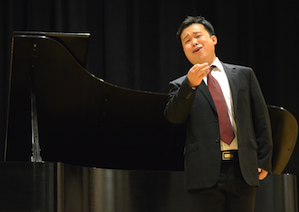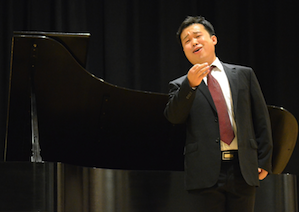
It’s been a busy fall for Ao Li. The Chinese baritone has spent much of the last month at the War Memorial Opera House, singing the role of Lorenzo in the San Francisco Opera’s production of Bellini’s The Capulets and the Montagues. His performance, marked by robust tone and dramatic intelligence, earned enthusiastic ovations and left critics reaching for superlatives.
On Oct. 24, though, Li will take his vocal gifts to a smaller stage. Joining mezzo-soprano Laura Krumm and pianist Robert Mollicone in works by Mozart, Rachmaninov, Schubert, and Thomas, Li will appear on the opening program of San Francisco Performances’ “Salons at the Rex.” The series offers intimate, hour-long concerts at 6:30 p.m. in the Hotel Rex near Union Square.
Li has been garnering attention ever since he arrived in the city in 2010 as a participant in San Francisco’s Merola Opera Program — though he allows that his arrival required a significant adjustment. “It was my first time to come to the U.S.,” he says. “I could barely speak English. All I could say was ‘Hello, how are you?’and ‘Where’s the bathroom?’”
Still, he plunged into his training. As one of the “Merolini,” he sang the role of Belcore in L’Elisir d’Amore. After Merola, he was invited to participate in the S.F. Opera’s elite Adler Fellowship Program. In his first year as an Adler fellow, he made his S.F. Opera main stage debut as Ascanio Petrucci in Lucrezia Borgia, returning as Dancaire in the company’s Carmen for Families.
Now in his second year in the Adler program, Li has made significant strides. Even those who had heard him in previous performances were unprepared for his current outing’s handsomely sung, sympathetic portrayal of Lorenzo, the benevolent physician to the Capulets.
“Vocally, it’s a very great role for me,” says the baritone, who boasts a generous, dark-hued instrument. “It’s in a very comfortable range. And Lorenzo is a kind man. He takes care of Giulietta, and he tries his best to make peace between the two families.”
Li has high praise for his Capulets colleagues — particularly Joyce DiDonato, singing the role of Romeo. “In my heart, she’s the best mezzo in the world,” he says. “The whole cast is fabulous. It’s just five singers. Nicole Cabell [singing Giulietta] is great. Saimir Pirgu [Tebaldo] has a wonderful voice. Eric Owens [Capellio] is amazing. I coached with him last week, and I learned so much from him. He’s not just an opera singer, he’s a very great musician. And [conductor] Riccardo Frizza is amazing, too. We worked together last year in Lucrezia Borgia, and he’s a great conductor for bel canto opera.”
Li began vocal studies in his native China, where his parents were oil company workers. Neither was a musician, but Li says there was always lots of music around. “My aunties, my grandparents, all enjoyed singing,” he recalls. But Li credits his studies at Shandong Normal University — and his vocal studies teacher, Fanjian Wei — with giving him an opera voice. While still at university, Li received extensive training in Chinese comedy performance style. “It’s a very special style, with lots of buffo roles,” he says. “It was very good experience for opera.”
“Sometimes on the opera stage, I feel like it’s a big party!” – Ao Li
It was Lydia Qiu, a vocal coach, pianist, and educator at University of Michigan, who brought Li to America. Qiu heard him sing in China and invited him to Michigan, gave him additional vocal coaching, and then took him to New York — where he met the San Francisco Opera Center’s Sheri Greenawald and Mark Morash. From there, it was an easy leap to the West Coast and the Merola program. In San Francisco, his vocal coach is César Ulloa, and Li says the training has been rigorous, but extremely rewarding.
Today, Li seems destined for roles in major houses. Next month, he’ll be back on the War Memorial stage, singing the role of Sciarrone in Puccini’s Tosca.
Right now, though, he’s looking forward to singing in the informal salon setting at the Hotel Rex. For the recital, he’s prepared two Chinese art songs, as well as Schubert’s “Die Forelle” and “Erlkönig.” From opera, he’ll sing the cavatina from Rachmaninov’s Aleko and Leporello’s “Catalog” aria from Mozart’s Don Giovanni, and will join Krumm in the Don Giovanni duet “La ci darem la mano” and “Legères hirondelles” from Thomas’ Mignon.
“It’s exciting,” he says. “Sometimes on the opera stage, I feel like it’s a big party! But when I do a recital, for maybe 40 or 50 people, it’s like a family party. I enjoy that very much.”

